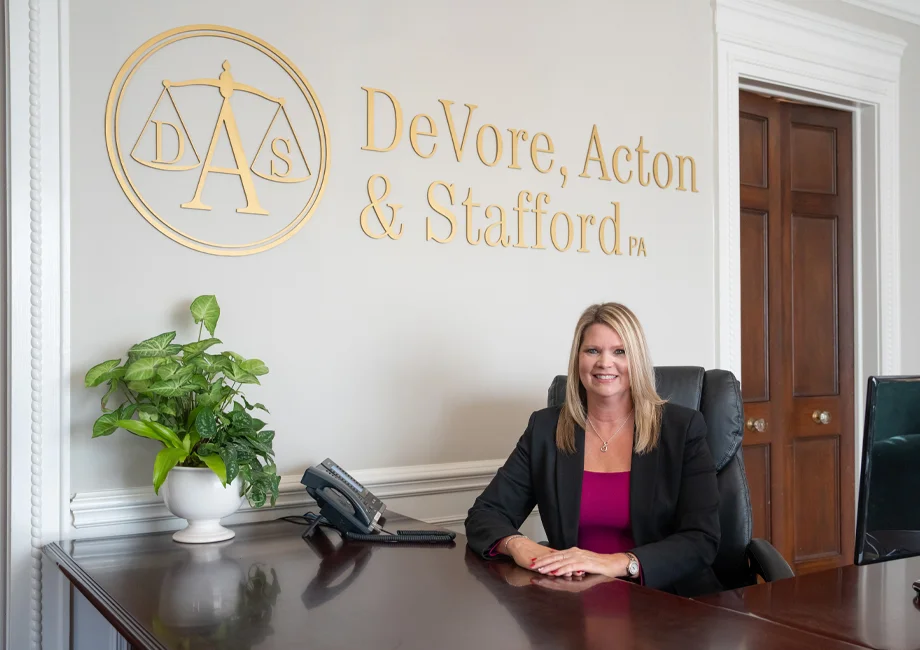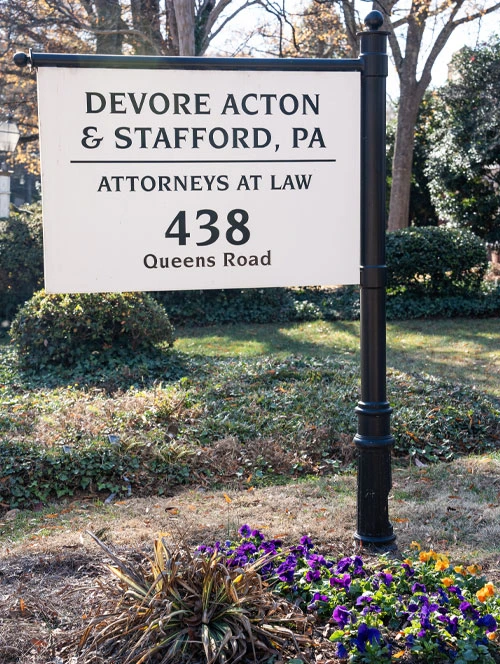Charlotte Utility Easement Lawyer
Charlotte Utility Easement Attorney
Owning property is a privilege enjoyed by many throughout North Carolina. Whether you own land for your residence, business, or future plans, it is something that you have control over. Unfortunately, there may be parts of your land where development may be outside of your control. Easements are designated areas of a property that allow others to manipulate your property for a specific purpose. For some property owners, these easements are known at the time of purchase, but some property owners are not so lucky.
At DeVore, Acton & Stafford, P.A., our real estate attorneys understand that there are a variety of reasons why people may use these easements. While some may use easements for simple matters, such as servicing utility lines or reading meters, other reasons may be more invasive, such as creating a right-of-way, engaging in construction projects, or conserving nature. No matter what the easement on your property may be used for, as a property owner, you still have rights. One of those is the right to challenge the easement and any intended use of it.
Types of Easements
There are a variety of easements that could impact your property. However, there are two main classifications: appurtenant and gross easements. Appurtenant easements are those that are in place between neighbors who may need to cross each other’s property to access a public space. A gross easement is one that is in place to benefit specific individuals or entities. A common example of this would be a utility company. Types of easements include:
Utility easements. These are the most common, but the least impactful, types of easements. These allow entities like utility companies to access specific areas of a property. Types of access needed include those to sewer lines or other utility lines that benefit more than just the individual property owner. These corridors, however, are often non-invasive for the property owner.
- Private easements. These easements are established when a property owner voluntarily awards or sells an easement to another individual or entity. This can occur, for example, if someone wishes to purchase an easement from a neighbor to install a private sewer line.
- Easements by necessity. Such easements exist for occasions when one person must cross through the property of another, often to access their own property. In these cases, a court may need to intervene and establish the easement.
- Prescriptive easements. Often the root of many easement disputes, this type of easement is most often created when one person uses the property of another without permission over a period of time.
For property owners, the idea that part of their land could be used for the purpose of another individual or entity can be difficult to accept, but most properties will have some easement in existence. Existing easement information should be provided in the deed to your property or in the documents provided at closing by your real estate agent. When in doubt, contact a real estate attorney who can help you find information about easements on your property and assist you in navigating their legalities.
Can a Property Owner Block an Easement in North Carolina?
An easement on your property does not mean that the individual or entity requesting or utilizing the easement owns that portion of your property. You still retain ownership, but an easement simply provides access for others to utilize your property for a specific purpose. For many property owners, this can be difficult to understand since they own the land and feel like they have full control over how their land will be used.
Unfortunately, this also leads to disputes regarding easements. Property owners are not allowed to block an easement on their property once it is established. For example, if a utility company requests or utilizes an easement on your property to place necessary wiring, you cannot destroy or remove the wiring or block access to the easement. If you are found in violation of easement law, you could be responsible for the damages to the holder of the easement.
However, property owners are protected as well. Those who hold an easement on the property of another individual are legally responsible for using the easement for its intended use. They are not allowed to place an undue or unreasonable burden on the property owner. If you are a property owner and have questions about the easement on your property or how the holder of the easement is utilizing it, you should reach out to a real estate attorney who can help you understand the relevant laws.
Who Is Responsible for Maintaining an Easement in North Carolina?
Because an easement allows your land to be used by another individual or entity for a specific purpose, you may be wondering if you are to maintain the easement. For example, if your neighbor needs to build a path on your property to gain access to theirs, it may seem unfair for you to maintain it. That thought is correct.
For most easements, it is the responsibility of the individual or entity who needs to access the easement to maintain it. However, you, as the landowner, may not purposefully cause undue difficulties in that process.
Exceptions to this do exist. The most common exception is when the care of an easement is specifically expressed in a deed, maintenance agreement, or law. An example of this would be a homeowner who has an easement in place, at the time of purchase, stating that the land five feet from the street is part of an easement owned by the city in case they wish to expand the street or build sidewalks. However, until the city enacts either of those two options, the homeowner is responsible for cutting the grass and maintaining that portion of their property. If, however, the city builds the sidewalk and it begins to crack or is damaged, the property owner is not responsible for maintaining or repairing the sidewalk.
In some cases, both the property owner and the individual or entity who uses the easement may share in the maintenance of the easement. This can occur when both parties make use of the easement equally.
Who Owns an Easement in North Carolina?
Easements do not transfer ownership of property from one person to another. The owner of the property retains ownership of the property. An easement simply grants access to another individual or entity to portions of the property owner’s land for a specific purpose. Those who use the easement have an obligation to respect the property owner and their property, and they cannot place any undue or unreasonable burden on either. Furthermore, those who use the easement cannot force the property owner from their land.
If the easement places a hindrance on you or your property, you have the right to appeal its usage in court. Once an easement is in place, it may only be removed through legal processes. If you wish to challenge the existence or usage of an easement on your property, you will want to speak with a real estate attorney.
Easements vs. Eminent Domain in North Carolina
For some property owners, discovering that an easement exists on their property or that an individual or entity wishes to place one on your property may be disconcerting. Often, an easement is confused with eminent domain claims.
In an eminent domain claim, the government claims your property and seizes control after offering what they feel is fair compensation. The purpose of the seizure is to use your land for a public works project. This could be the building of a new road, a public building, a park, or other such ventures. However, in eminent domain cases, the property owner gives up their right to the property through a forced sale of their land.
In cases of an easement on your property, you maintain the rights and ownership of your land. The individual or entity that wishes to use your property does not own any financial stake in it. Should you wish to sell your property, you may legally do so, though the easement in place will sell with it. However, an easement on your property may limit your individual usage of the land. For example, if an easement is granted for a road or driveway that allows your neighbor to access their property through yours, you are no longer allowed to alter or build on that portion of your property.
Charlotte Easement Attorneys
An easement on your property may be inconvenient, but it is sometimes necessary. However, your rights as a property owner deserve to be protected. At DeVore, Acton & Stafford, P.A., our real estate attorneys understand the burden that an easement may cause you, no matter what type of easement you may be facing. Whether an easement already exists or an individual or entity is seeking an easement on your property, it is important to understand the protections in place for your property and the rights you have to hold the easement owner accountable. Contact our offices today and let us help answer your easement questions so you can protect your property investment.

request your consultation
"*" indicates required fields



